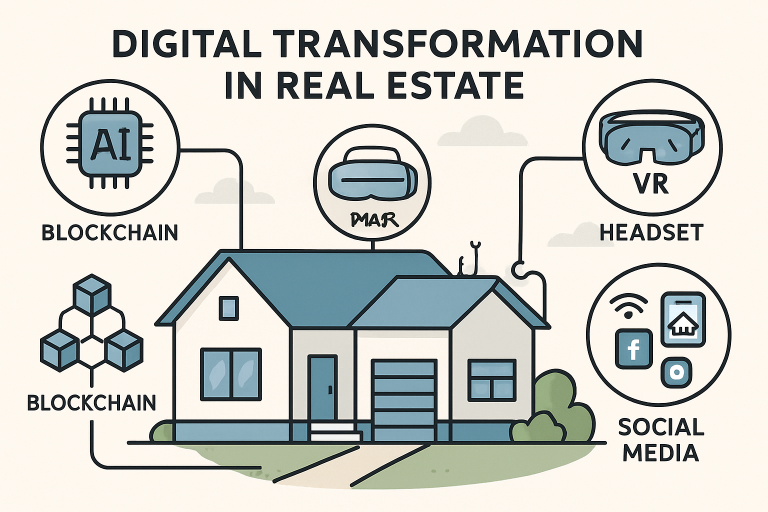Key Takeaways:
- Artificial Intelligence (AI) and Big Data are revolutionizing property valuation and market analysis.
- Virtual and Augmented Reality (VR/AR) are enhancing property viewing experiences.
- Blockchain technology is streamlining real estate transactions through the use of smart contracts and tokenization.
- Internet of Things (IoT) devices are transforming homes into innovative, energy-efficient environments.
- Social media platforms are reshaping real estate marketing strategies.
Rapid advancements in technology are transforming every aspect of residential real estate, from how properties are valued and showcased to the ways homes are sold and managed. Today, digital tools empower both buyers and sellers to make faster, smarter decisions and are closing the gap between international markets and local listings. In highly competitive regions, Menlo Park real estate agents Straser Silicon Valley utilize cutting-edge technologies to streamline transactions and enhance client experiences.
The ongoing integration of artificial intelligence, virtual reality, blockchain, IoT, and innovative marketing platforms drives this shift. These trends not only help professionals deliver more value for their clients but also provide consumers with convenience and transparency, fundamentally reshaping expectations within the industry.
As the digital transformation accelerates, understanding the latest developments is crucial for anyone involved in buying, selling, investing, or simply staying current with the real estate sector’s rapid pace. From data-driven valuations to immersive home tours, the adoption of technology in real estate is proving to be a game-changer on a global scale.
Those ready to embrace these innovations will find themselves at a distinct advantage, able to access more accurate information, execute transactions faster, and enjoy unprecedented control over their real estate journeys.

AI and Big Data in Property Valuation
The era of relying solely on traditional appraisals is giving way to data-driven forecasts and AI-powered evaluation tools. Artificial Intelligence (AI) and Big Data analyze massive datasets to accurately determine property values, rental yields, and even forecast market trends. These systems can identify patterns that may escape human appraisers, such as the impact of new transportation links or upcoming commercial developments. Beyond pricing, AI models can offer risk assessments and investment projections, empowering both homebuyers and real estate professionals to make more informed decisions.
Virtual and Augmented Reality in Property Viewing
Virtual and Augmented Reality (VR/AR) are elevating house hunting and property marketing to entirely new levels. Virtual tours allow prospective buyers to “walk through” homes remotely, saving time and travel costs. Sophisticated 3D modeling and AR overlays can help buyers visualize renovation possibilities, rearrange furniture, or assess design options without setting foot on the property.
The adoption of VR technology became especially prominent during the COVID-19 pandemic, helping agents and clients maintain momentum during lockdowns. These digital experiences remain popular due to their unparalleled convenience and efficiency, particularly for international buyers and busy professionals. Enhanced media packages that include high-definition virtual tours and interactive floor plans attract more views and leads than standard listings, giving tech-savvy sellers a distinct advantage.
Blockchain for Secure Transactions
Blockchain technology is bringing security, transparency, and speed to an industry that traditionally faces lengthy paperwork and potential fraud. Through blockchain, property records are stored in a secure, immutable ledger. Smart contracts—self-executing contracts with terms encoded directly into blockchain—reduce reliance on middlemen, streamline transactions, and help cut closing times.
This technology also aids in verifying ownership history, making it harder for title fraud to occur. Tokenization, or representing property ownership with blockchain-based digital tokens, opens possibilities for fractional ownership, making it easier for investors to participate in property assets. As smart contract adoption grows, cost savings and trust-building represent major benefits for buyers, sellers, and real estate agents.
IoT and Smart Homes
The rise of the Internet of Things (IoT) has given birth to smart homes where everyday devices interact seamlessly to support safety, comfort, and sustainability. Devices such as smart thermostats, lighting systems, locks, and security cameras now enable homeowners to control their environments via smartphones and voice assistants remotely. Resources like HowStuffWorks provide a helpful breakdown of how smart home technology works in practice, offering insight into the systems that make these innovations possible.
Smart homes are not just convenient; they save energy and reduce utility costs. For example, learning thermostats can adjust HVAC systems automatically based on usage patterns, while integrated sensors can detect water leaks or security breaches in real time. These features appeal increasingly to eco- and tech-conscious buyers, adding long-term value to properties.
Social Media’s Impact on Real Estate Marketing
Social media platforms like Instagram, Facebook, and TikTok are fundamentally reshaping how properties are marketed. Real estate agents can showcase listings to large audiences using striking images, drone videos, and livestream events. Engaging content, including virtual open houses and interactive question-and-answer sessions, spreads quickly, helping agents attract potential buyers across demographics.
Social media isn’t just about exposure; it’s also about insights. Analytics tools allow agents and developers to track engagement, learn what features or locations are most appealing, and adjust their marketing strategies accordingly. As highlighted by the National Association of Realtors in their guide to social media, these platforms serve as powerful tools for building trust, creating connections, and keeping sellers’ listings at the forefront of the marketplace.
Conclusion
From AI-powered valuations and immersive 3D home tours to blockchain-secured deals, smart home systems, and inventive social media marketing, technology is dramatically reshaping the residential real estate landscape. The advantages are clear: enhanced transparency, faster processes, convenience, and greater flexibility for all parties. Adapting to these changes is now essential for real estate professionals and ideal for homebuyers and sellers seeking the best possible outcomes in today’s tech-driven market.